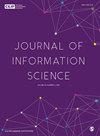Constructing a multi-layer heterogeneous networks model to explore the public opinion evolution pattern of key users in public health emergencies
IF 1.7
4区 管理学
Q3 COMPUTER SCIENCE, INFORMATION SYSTEMS
引用次数: 0
Abstract
This article aims to discover key users in public health emergencies and explore their public opinion evolution patterns, thus providing theoretical support for the establishment of a clear cyberspace. In this article, a multi-layer heterogeneous network model based on multiple node attributes (user nodes, microblogs nodes, emotional nodes and topic nodes) is constructed at each stage of the public opinion cycle. Specifically, a novel semi-supervised self-training method based on the bidirectional encoder representations from transformers (SSST-BERT) method is proposed to automatically label the fine-grained emotional nodes. The latent Dirichlet allocation (LDA) model is used to construct the topic nodes. Moreover, the degree centrality, betweenness centrality and closeness centrality of the constructed heterogeneous network are adopted to dynamically identify key users. Finally, the emotional states and topic tendencies of key users are explored to obtain the public opinion evolution pattern of emergencies. The experimental results show that the SSST-BERT automatically labels emotion categories with an F1-score of 80.48%. The key users identified by the constructed heterogeneous network are more representative of the opinion status of ordinary users. Analysis of the public opinion status of key users reveals that netizens show more negative emotions such as anger and fear in public health emergencies, and the shift of focus drives the evolution of discussion topics.构建多层异构网络模型,探索突发公共卫生事件关键用户舆情演变规律
本文旨在发现突发公共卫生事件中的关键用户,探索其舆情演变规律,为构建清晰的网络空间提供理论支持。本文在舆情周期的各个阶段构建了基于多节点属性(用户节点、微博节点、情感节点和话题节点)的多层异构网络模型。具体而言,提出了一种基于双向编码器表示的半监督自训练方法(SSST-BERT)来自动标记细粒度情感节点。使用潜在狄利克雷分配(latent Dirichlet allocation, LDA)模型构建主题节点。采用构建的异构网络的度中心性、中间中心性和紧密中心性来动态识别关键用户。最后,对关键用户的情绪状态和话题倾向进行分析,得出突发事件的舆情演变规律。实验结果表明,SSST-BERT自动标记情绪类别的f1得分为80.48%。构建的异构网络识别出的关键用户更能代表普通用户的意见状态。对重点用户舆情现状的分析表明,突发公共卫生事件中,网民表现出更多的愤怒、恐惧等负面情绪,焦点的转移推动了讨论话题的演变。
本文章由计算机程序翻译,如有差异,请以英文原文为准。
求助全文
约1分钟内获得全文
求助全文
来源期刊

Journal of Information Science
工程技术-计算机:信息系统
CiteScore
6.80
自引率
8.30%
发文量
121
审稿时长
4 months
期刊介绍:
The Journal of Information Science is a peer-reviewed international journal of high repute covering topics of interest to all those researching and working in the sciences of information and knowledge management. The Editors welcome material on any aspect of information science theory, policy, application or practice that will advance thinking in the field.
 求助内容:
求助内容: 应助结果提醒方式:
应助结果提醒方式:


